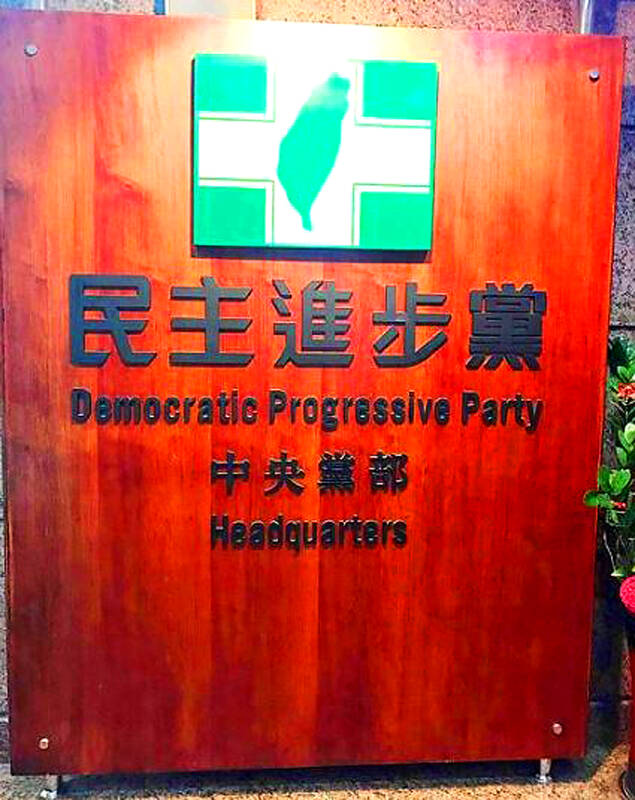Vice President William Lai (賴清德), the Democratic Progressive Party’s (DPP) presidential candidate, has pledged to safeguard democracy and contribute to peace and stability across the Taiwan Strait and in the Indo-Pacific region.
Lai laid out his foreign policy platforms in front of 96 diplomats from 50 countries stationed in Taiwan, as well as representatives from foreign chambers of commerce at the DPP Diplomatic Reception on Thursday.
Democracy, peace and prosperity are not only DPP core values, but also “represent the common aspirations of the Taiwanese people” and the principles he planned to carry onward to forge “a new era of value-based diplomacy,” Lai said.

Photo: Taipei Times
Democracy is in the DNA of the Taiwanese people, but is threatened by authoritarian aggression such as Russia’s invasion of Ukraine and China’s military adventurism in the region, he said.
If elected, “Taiwan will be at the center of supporting democratic values worldwide” by devoting efforts to “contribute meaningfully to global democracy, human rights and the rule of law,” he said.
“The defense of democracy anywhere is the defense of democracy everywhere,” he added.
Lai said that his administration would empower non-governmental organizations and institutions such as the Taiwan Foundation for Democracy in sharing Taiwan’s democratic achievements with the world and build stronger international connections to safeguard shared values.
Taiwan should work with like-minded countries to fight against growing hybrid and cognitive threats, which take advantage of artificial intelligence and are designed to divide society, he said.
Lai also pledged to continue assisting Ukrainians by providing more humanitarian aid and supporting the rebuilding of its cities and communities.
On cross-strait relations, Lai said Taiwan would be “a proactive contributor to peace and stability across the Taiwan Strait and in the Indo-Pacific region,” working with international partners to maintain the “status quo.”
The nation “will not bow down in the face of pressure” nor provoke conflict, but would be dedicated to fulfilling the “responsibility” of serving the interests of both Taiwanese and the global community, he said.
He called on both sides of the Taiwan Strait to cooperate in protecting the international order and contributing to the prosperity and well-being of all people.
The effort is also to be based on his previously proposed “four pillar plan,” which focuses on defense, deterrence, international cooperation, economic security, and steady and principled cross-strait leadership to preserve peace in the Taiwan Strait, he said.
Regarding development and economic plans, Lai vowed to prioritize closer bilateral and multilateral trade ties with the international community, adding that he would continue Taiwan’s bid to join the Comprehensive and Progressive Agreement for Trans-Pacific Partnership and continue the New Southbound Policy.
Promoting supply chain security and protecting the nation against economic coercion from Beijing are also crucial, he said.

The brilliant blue waters, thick foliage and bucolic atmosphere on this seemingly idyllic archipelago deep in the Pacific Ocean belie the key role it now plays in a titanic geopolitical struggle. Palau is again on the front line as China, and the US and its allies prepare their forces in an intensifying contest for control over the Asia-Pacific region. The democratic nation of just 17,000 people hosts US-controlled airstrips and soon-to-be-completed radar installations that the US military describes as “critical” to monitoring vast swathes of water and airspace. It is also a key piece of the second island chain, a string of

A magnitude 5.9 earthquake that struck about 33km off the coast of Hualien City was the "main shock" in a series of quakes in the area, with aftershocks expected over the next three days, the Central Weather Administration (CWA) said yesterday. Prior to the magnitude 5.9 quake shaking most of Taiwan at 6:53pm yesterday, six other earthquakes stronger than a magnitude of 4, starting with a magnitude 5.5 quake at 6:09pm, occurred in the area. CWA Seismological Center Director Wu Chien-fu (吳健富) confirmed that the quakes were all part of the same series and that the magnitude 5.5 temblor was

The Central Weather Administration has issued a heat alert for southeastern Taiwan, warning of temperatures as high as 36°C today, while alerting some coastal areas of strong winds later in the day. Kaohsiung’s Neimen District (內門) and Pingtung County’s Neipu Township (內埔) are under an orange heat alert, which warns of temperatures as high as 36°C for three consecutive days, the CWA said, citing southwest winds. The heat would also extend to Tainan’s Nansi (楠西) and Yujing (玉井) districts, as well as Pingtung’s Gaoshu (高樹), Yanpu (鹽埔) and Majia (瑪家) townships, it said, forecasting highs of up to 36°C in those areas

IN FULL SWING: Recall drives against lawmakers in Hualien, Taoyuan and Hsinchu have reached the second-stage threshold, the campaigners said Campaigners in a recall petition against Chinese Nationalist Party (KMT) Legislator Yen Kuan-heng (顏寬恒) in Taichung yesterday said their signature target is within sight, and that they need a big push to collect about 500 more signatures from locals to reach the second-stage threshold. Recall campaigns against KMT lawmakers Johnny Chiang (江啟臣), Yang Chiung-ying (楊瓊瓔) and Lo Ting-wei (羅廷瑋) are also close to the 10 percent threshold, and campaigners are mounting a final push this week. They need about 800 signatures against Chiang and about 2,000 against Yang. Campaigners seeking to recall Lo said they had reached the threshold figure over the